The peak of the career and fall of Alexander Menshikov
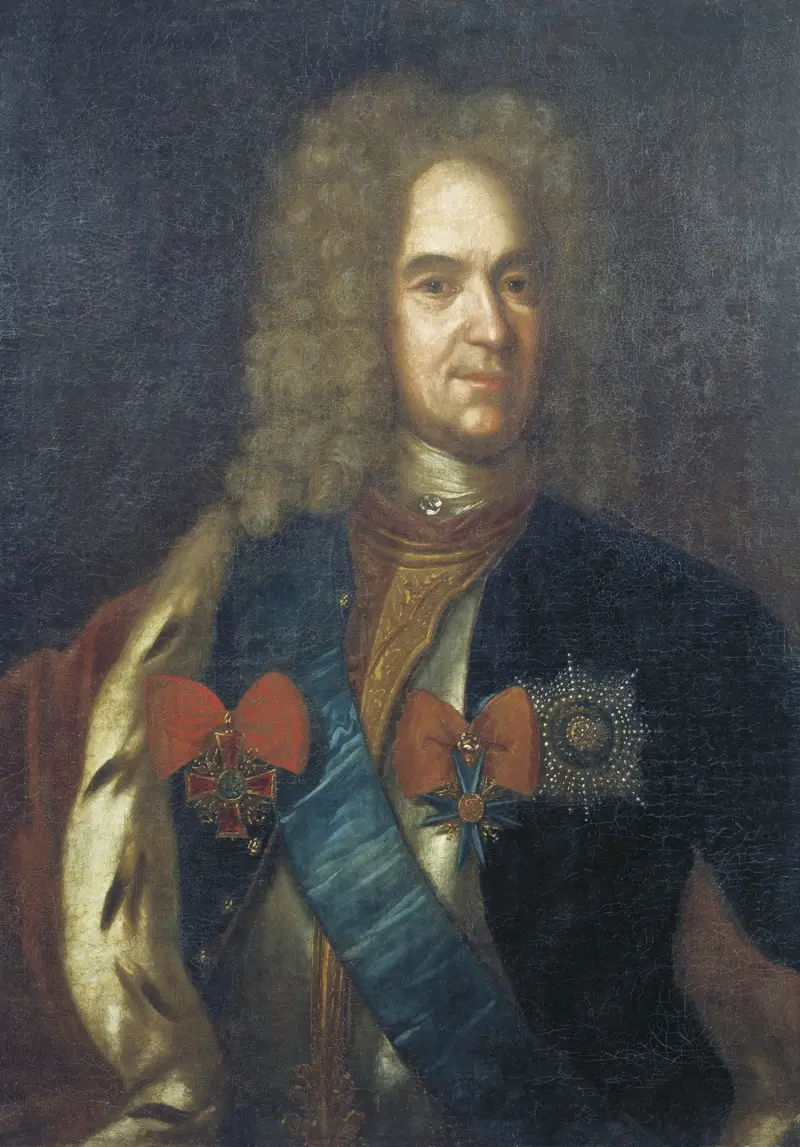
A. Menshikov in 1725–1727, portrait of an unknown artist
In this article we will finish the story about the fate of Alexander Menshikov and talk about how the fate of his children turned out, as well as about the famous great-grandson of this favorite of Peter I.
The peak of Alexander Menshikov's career
In February 1722, Peter I issued a Decree on Succession to the Throne, according to which the reigning monarch himself now had to appoint his successor. By a cruel irony of fate, the emperor was unable to exercise this right, since, while dying, he managed to write only two words: “Give up everything...”
The sarcastic Maximilian Voloshin commented on this episode in the poem “Russia” he wrote in 1924:
"Give it all ..."
Fate added:
“...to dissolute women with their boyfriends”...
Queens are crowned king
By the lust of the guard stallions."
Catherine became the first of such empresses.
At that time, two parties fought at the Russian Court. The first (“aristocratic” or “boyar”) wanted to see the young Peter Alekseevich, the grandson of Peter I, as the new emperor. This was the most legitimate contender for the throne, the last descendant of the Romanov family in the male line (Peter III, the grandson of Peter I from his daughter Anna, formally belonged to to the Holstein-Gottorp family).
But the party of “new people”, nominated under the deceased emperor, supported the candidacy of his wife Catherine - a person of unknown origin (either a Swede, or a German from Courland, but possibly Lithuanian or Latvian) and with an extremely dubious past. The choice seemed obvious, but Menshikov brought soldiers of the guards regiments who threatened to “split the heads” of those who disagreed to vote for “Mother Catherine.”
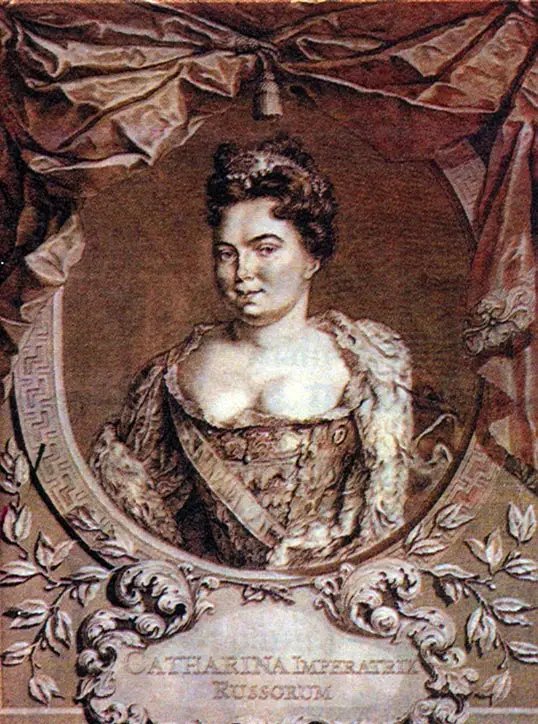
Ekaterina Alekseevna, engraving, 1724
The fates of Catherine I and the famous Byzantine Theodora seem very similar, but the first Russian empress did not have the slightest talent as a statesman, nor did she have the desire to become co-ruler of her husband, and then to rule the country on whose throne she unexpectedly ascended.
Catherine spent the rest of her life at balls and at the dinner table, quickly became decrepit and, at the age of 43, died from the consequences of excessive drinking on May 6, 1727. During the short reign of this empress, all affairs were managed by a specially created Supreme Privy Council, in which Alexander Menshikov played the main role.
In addition, Catherine reinstated him as president of the Military Collegium and governor of St. Petersburg, and awarded him the Order of Alexander Nevsky. It was now, after the death of Peter I and the accession of his wife, that Menshikov reached the pinnacle of his power. Seeing how rapidly Catherine’s health was deteriorating, he decided to “bet” on 11-year-old Pyotr Alekseevich.
To control the boy emperor, Menshikov settled him in a palace that belonged to him. Moreover, he planned to become related to the kings, marrying his 15-year-old daughter Maria to Peter. And therefore he refused very flattering offers from Peter Sapieha and even from the crown prince of the German royal house of Anhalt-Dessau.
It is curious that the German prince was refused on the grounds that one of the members of his dynasty had once married the daughter of a pharmacist. From the state treasury, Maria received 53 rubles as compensation for the cost of the dowry, 679 rubles on account of some gift allegedly promised by Catherine I, and 31 for the maintenance of the court of the “betrothed bride.”
In honor of the wedding of the emperor and his daughter, Menshikov was going to issue a coin with the letter “M” printed on it.
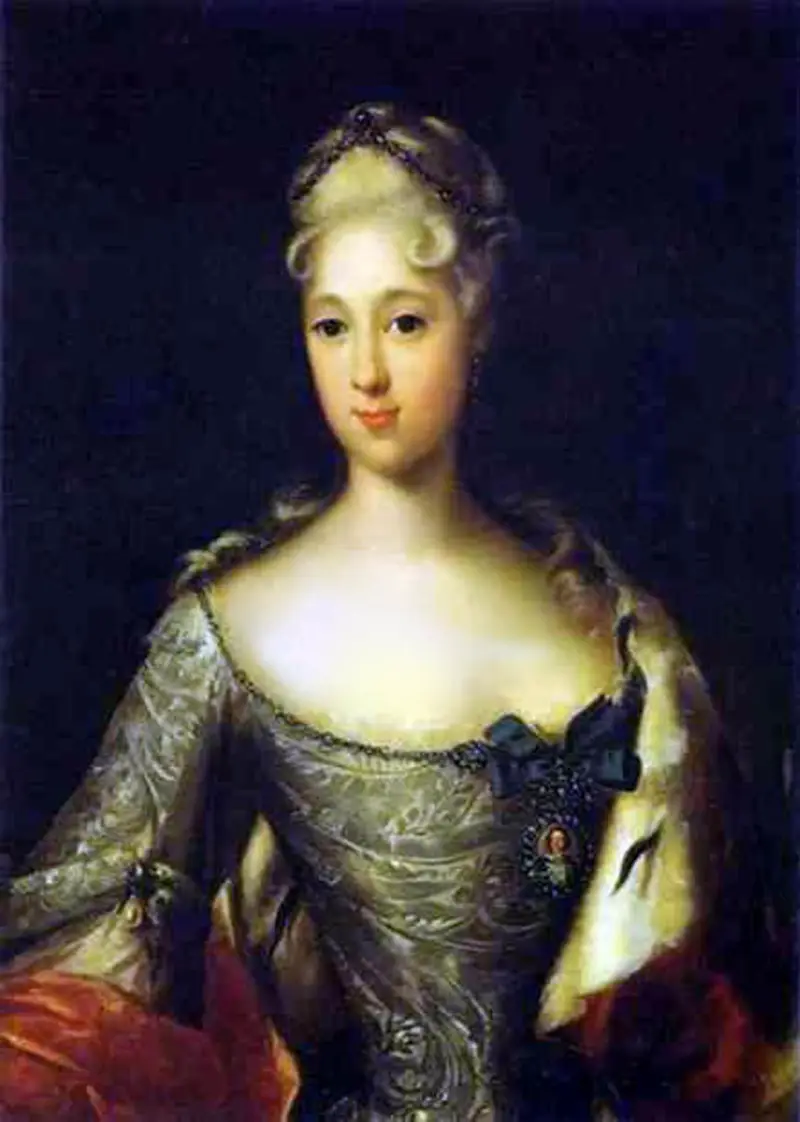
I. G. Tannauer. Maria Alexandrovna Menshikova
There are many tales told about Peter II. However, A.I. Osterman, appointed his mentor and educator, saw in front of him a tall and precocious boy of “angelic beauty” (this feature of appearance was noted by many contemporaries) - just a prince from a fairy tale.
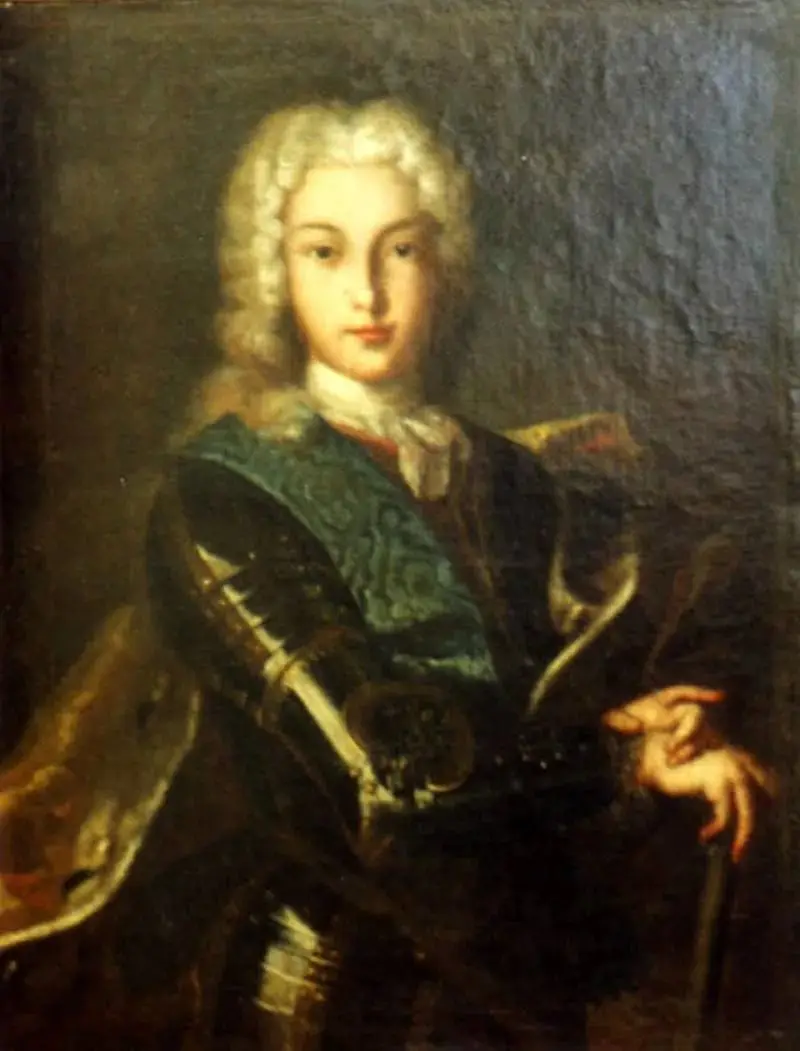
A.P. Antropov. Portrait of Emperor Peter II in a wig
The grandson of Peter I already knew Latin, spoke fluent French and German, and demonstrated good learning abilities. In addition, he was an excellent shot with real guns and cannons.
In general, the teenager was very promising, and his early death on January 19 (30), 1730 came as a shock to the whole society. The inscription on the tombstone of Peter II in the Archangel Cathedral of the Moscow Kremlin reads:
Since Peter II was still a minor at the time of his accession to the throne, the state continued to be governed by the Supreme Privy Council. It was still dominated by Menshikov, who appointed himself admiral and generalissimo, commander-in-chief of the armed forces of the Russian Empire. In the court calendar for 1728, his relatives were included as members of the imperial family.
But Menshikov’s relationship with Peter II did not work out. The emperor was burdened by his care and did not feel any attraction to his bride, the daughter of a temporary worker, calling her a “marble statue” and a “porcelain doll.” And he often beat his son Alexander.
But Menshikov’s daughter Alexandra Alexandrovna was a close friend of Peter II’s beloved sister Natalya Alekseevna; in her letters the Grand Duchess called her “the most kindly dear sister.” In the spring of 1727, Catherine I granted Alexandra Menshikova and her sister Maria her portraits, decorated with diamonds - to be worn on the St. Andrew's ribbon, and in the summer - the Order of St. Catherine. Her father was preparing her marriage to the Anhalt-Nassaus Crown Prince.
The young prince Ivan Alekseevich Dolgorukov, the son of one of the “supreme leaders,” gained great influence on the young emperor. He organized for Peter several days of dog or falconry hunting, playing cards and parties with available girls. It was difficult for Peter’s mentor A.I. Osterman to resist this influence.
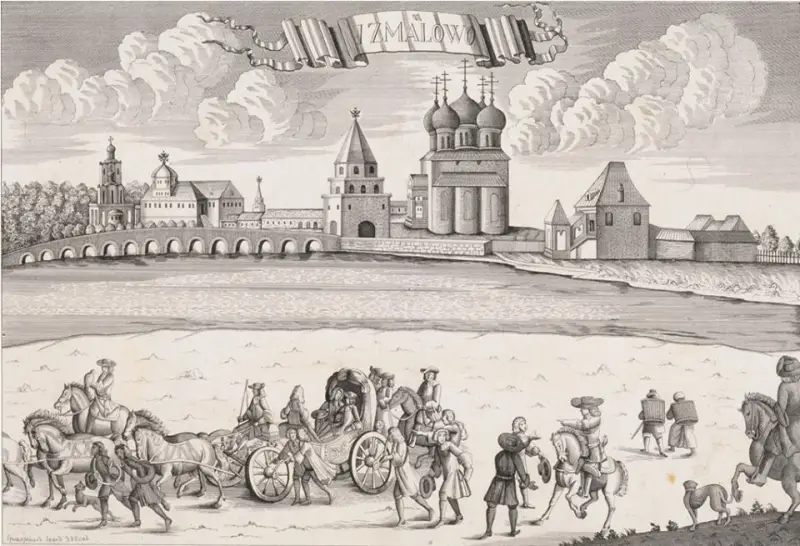
Zubov I. “Izmailovo. Peter II's departure for falconry"
In addition, Peter fell in love with his young aunt Elizabeth, daughter of Catherine I, who was 6 years older than him (like his first bride, Maria Menshikova). According to contemporaries, this frivolous princess flirted with her nephew with all her might. Since young Peter, through the efforts of Ivan Dolgoruky, already had experience in “adult” communication with women,” it is difficult to say how far their relationship went.
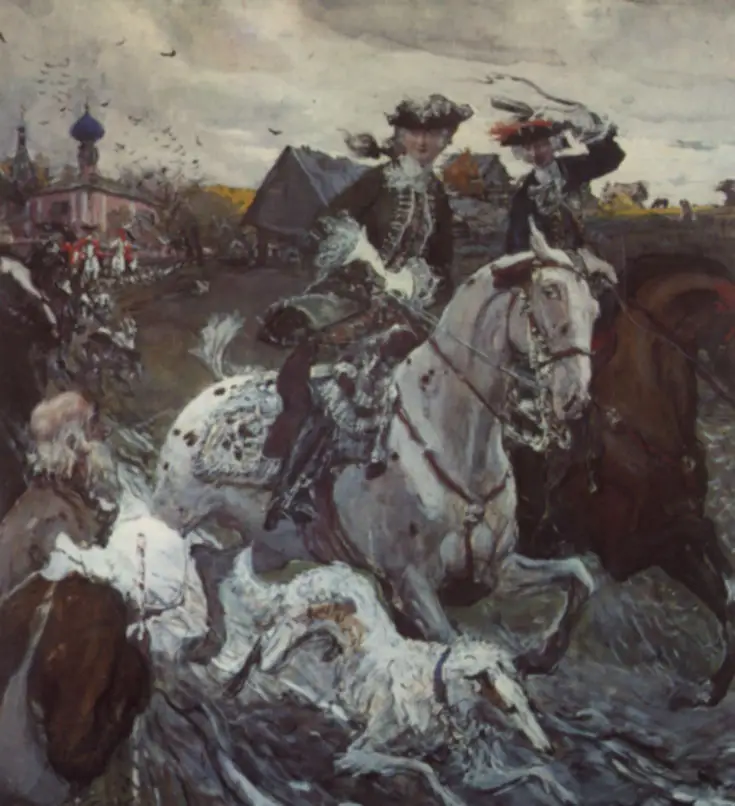
V. Serov. Peter II and Princess Elizabeth hunting
It is known that the issue of marriage between Peter II and Elizabeth was seriously considered, but not only Menshikov, but also the Dolgorukovs wanted to become related to the emperor, who then betrothed him to the sister of Ivan Dolgorukov’s bosom friend, Princess Ekaterina Alekseevna (this girl was only 3 years older than Peter) .
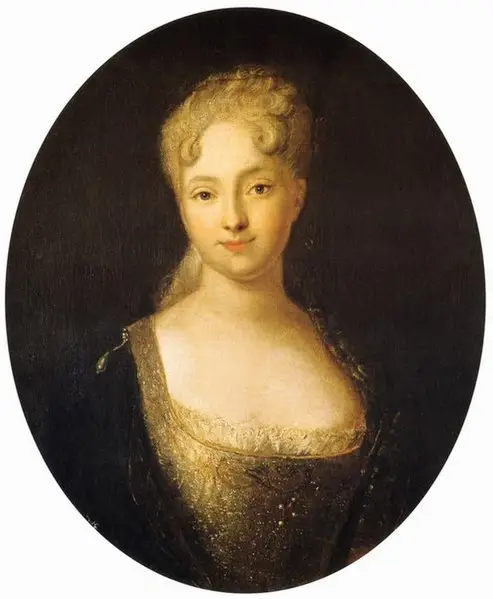
E. Dolgorukova in a portrait by an unknown artist, 1729
But we got ahead of ourselves.
So far, everything was in charge of Alexander Danilovich Menshikov, who himself, literally out of the blue, provoked a conflict with the emperor - he appropriated several thousand gold chervonets presented to Peter by the merchant delegation. The matter was further aggravated by the fact that the boy wanted to give this money to his beloved sister Natalya.
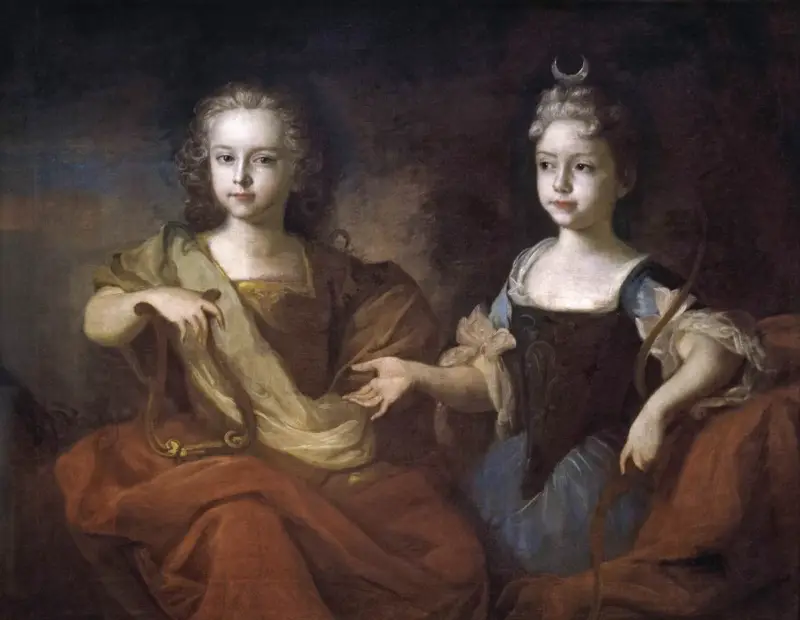
Louis Caravaque. Peter and Natalya - grandson and granddaughter of Peter I in the images of Apollo and Diana, 1772
The young emperor created a huge scandal, Menshikov returned the money, but the crack in their relationship had already become visible to the naked eye. And then, during the illness of the temporary worker, the Dolgorukovs showed Peter the interrogation protocols of his father, signed by Menshikov, Tolstoy and Yaguzhinsky. The boy was shocked to the core, and the fate of Alexander Danilovich was decided.
On September 7 (19), 1727, when the recovered Menshikov went to Oranienbaum to consecrate the new church, Peter II left his palace and went to Peterhof, where he signed a decree in which His Serene Highness was forbidden to return to St. Petersburg.
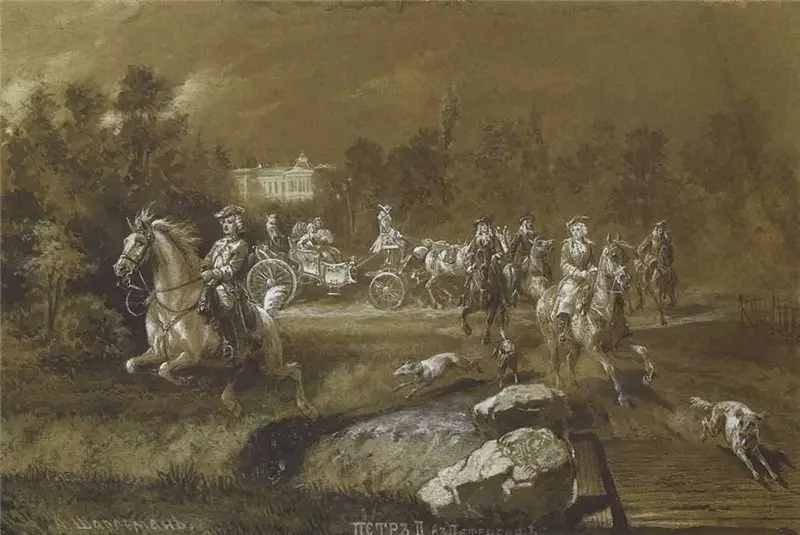
A. Charlemagne, Peter II in Peterhof
On September 9, Menshikov was deprived of all positions, awards, titles and sentenced to exile to the Ranenburg estate that belonged to him (now the city of Chaplygin, Lipetsk region). The family of the overthrown temporary worker set out in four carriages, which were accompanied by 150 carts, 11 wagons and 147 servants. But in April of the following 1728, a new order followed - the confiscation of all estates and 99 thousand “souls” of serfs, as well as all property, including 13 million rubles.
The fallen temporary worker was left with a sable hat, a green satin beshmet, a caftan, a camisole, a robe (in which he was buried) and three pillows. The whole family was provided with a copper cauldron, three pots, 12 tin dishes and plates, and three iron tripods. In addition, the Menshikovs were left with 10 servants. Now the distant Ural city of Berezov (Khanty-Mansiysk Autonomous Okrug) was declared a place of exile.
By the way, the Dolgorukovs who “dumped” Menshikov very soon repeated his fate - they also went into exile in Berezov, including the second bride of Peter II, Catherine. And then, already under Elizabeth, A.I. Osterman was sent to Berezov. Some Decembrists and Leon Trotsky also visited here.
But let's return to A. Menshikov and his family.
Alexander Danilovich’s wife, Daria Mikhailovna, did not reach the place of exile and died on the way 7 miles from Kazan.
In Berezovo, the Menshikovs were settled in the former Resurrection Monastery, closed in 1723. Not far from it, Menshikov, with the help of servants, built a wooden church, where he performed the duties of a sexton during services.
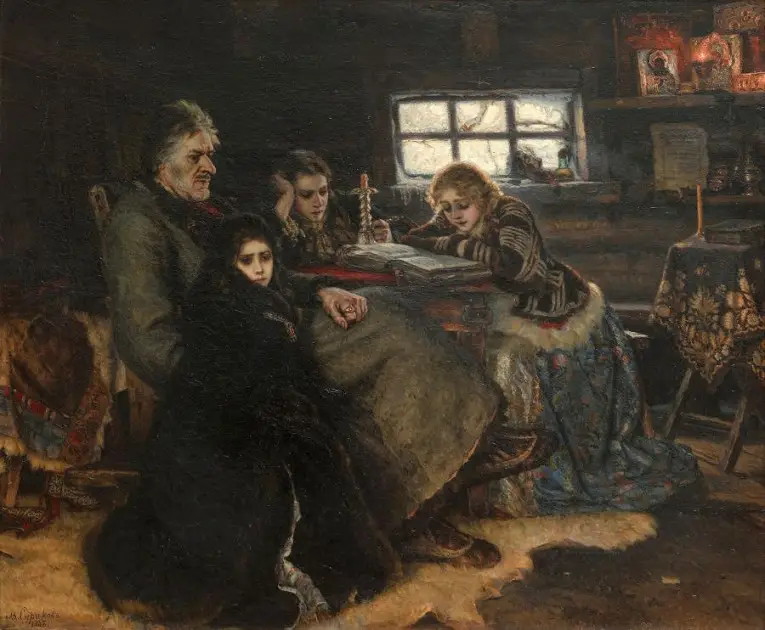
V. Surikov. Menshikov in Berezovo. 1883. The image of Maria Menshikova (in the foreground - in a fur coat) depicts the artist’s wife, Elizaveta Avgustovna, who died 5 years later, in 1888.
The closest friend and collaborator of Peter I died of smallpox at the age of 55 - November 12 (23), 1729. Dying, he bequeathed to his children to stay away from the royal court. And on December 26, his 18-year-old daughter Maria, the former royal bride, who developed tuberculosis in exile, also died of smallpox. The remaining children, who had the same names - Alexandra (born in 1712) and Alexander (born in 1714), also fell ill, but survived.
The now lost grave of A.D. Menshikov was opened in 1825 on the initiative of the famous historian D.N. Bantysh-Kamensky, who was then the governor of Tobolsk. Menshikov's body was perfectly preserved; it turned out that he was buried in a robe, a quilted hat and shoes with pointed heels. The cross taken from the body was sent to the prince’s descendants. The remains were reburied, the grave was surrounded by a fence.
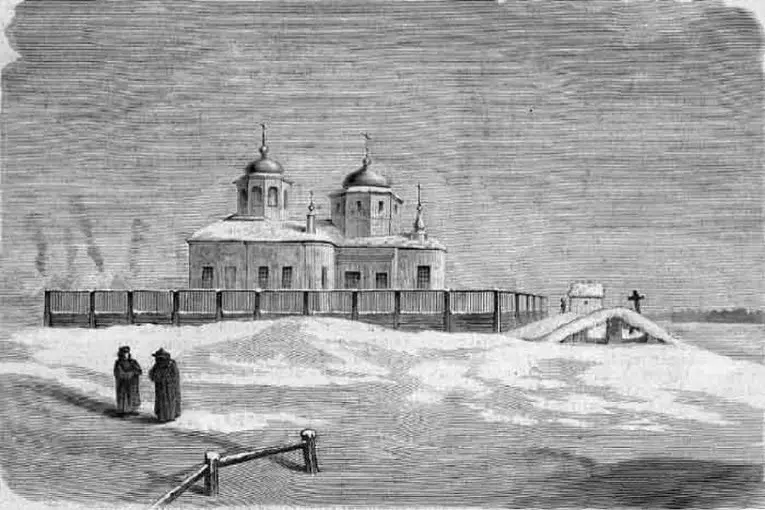
I. Panov. Cathedral in Berezovo and the grave of Prince Menshikov. 1871
This exhumation aroused the anger of Nicholas I, to whom this situation was presented by the enemies of Bantysh-Kamensky as sacrilege and desecration of the grave.
In 1972, the name “Menshikov” was given to a small planet discovered by employees of the Crimean Astrophysical Observatory.
Descendants of the “semi-sovereign ruler”
After Anna Ioannovna’s accession to the throne, the surviving children of Peter I’s favorite were returned to St. Petersburg in 1731. Alexandra Menshikova became Anna Ioannovna’s maid of honor, her previously confiscated clothes and bed linen were returned to her, and the gold and silver dishes were replaced with copper and tin. There was no talk of returning other property.
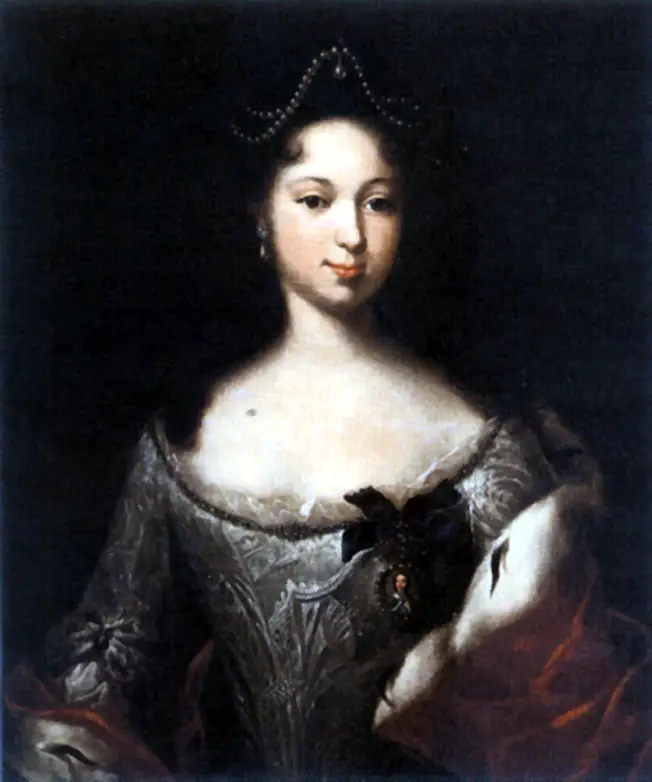
Portrait of Alexandra Alexandrovna Menshikova
On May 4 (15), 1732, she married the younger brother of Anna Ioannovna’s famous favorite, Major General and Guard Major Gustav Biron. There is nothing bad to say about this man. Before moving to Russia (in 1730), he served in the Polish army and received the rank of captain.
In 1735 he took part in the Rhine campaign of General Lassi (one of the episodes of the War of the Polish Succession). In 1738, during the next Russian-Turkish War, he commanded the guards combined detachment at Ochakov and Sinkovtsy and was promoted to lieutenant general, in February 1738 he became chief general. His marriage to Alexandra Menshikova was concluded for love (he never even received a dowry), and Gustav was very sad after her death from childbirth (along with her child - in 1736). The wife of the English envoy, Lady Rondo, recalled:
Approaching the door of the room where the deceased lay, he stopped and asked for a deer antler tincture; Having drunk it and, it seemed, having gathered his strength, he approached the coffin and fainted. After being carried out of the room and revived, the coffin was carried downstairs and placed on an open chariot, followed by a long train of carriages and a guards escort, for she was the wife of a military commander.
For burial, the body was taken to the monastery of St. Alexander, and although the lid of the coffin was closed while driving through the streets, it was removed again in the church, and the same farewell ceremony was repeated again, but without her husband: he was taken home, for he fainted for the second time as soon as They opened the coffin."
But Gustav Biron is a military officer who risked his life more than once, and, of course, it was impossible to frighten him at the sight of a dead man.
By the way, after the arrest of his elder brother, all of Gustav Biron’s property during confiscation was valued at 5 rubles - a very modest amount for his position. In addition to his worldly belongings, he only had two rings - gold and silver. And his older brother, Ernst Johann Biron, Anna Ioannovna’s favorite, after his arrest brazenly demanded a trial and asked awkward questions:
No one was able to show it, and therefore Biron was accused of not going to church, not caring about Anna Ioannovna’s health and treating her disrespectfully (!), treating Anna Leopoldovna and her husband impudently, threatening to bring the prince to Russia Holstein (the future Peter III) and other nonsense.
Now let's talk about Alexander Alexandrovich Menshikov, who was previously the chamberlain of Empress Catherine I, and his father wanted to marry him to Grand Duchess Natalya, the sister of Peter II.
After this young man returned from exile to Russia, he managed to return the money that his father had sent to banks in Venice and Amsterdam - about half a million rubles. Almost all of them went to the treasury; Alexander Menshikov Jr., according to Vice Admiral Francois Guillaume Villebois, in gratitude for his assistance in returning the funds, was only “borrowed the position of staff captain of the guard.”
It was he who brought the news of Catherine II’s accession to the throne to Moscow. He was married to Elizaveta Petrovna Golitsyna, who gave birth to four children. He retired with the rank of general-in-chief. His grandson (great-grandson of the favorite of Peter I) - Alexander Sergeevich Menshikov, had a reputation as the most brilliant wit of his time. It was about him that Ermolov said that, in the absence of a razor, Prince Menshikov could shave with his own tongue.
They say that the Life Guards who did not directly participate in the suppression of the Hungarian uprising, unlike the soldiers of other regiments, did not receive a commemorative medal due to the fact that Menshikov proposed to give them a special version of this award - with the inscription “There and back.”
It must be said that A.S. Menshikov did not have any special talents as a commander, administrator or diplomat, but he was very energetic, had an excellent memory, and learned everything surprisingly quickly. Denis Davydov said that Menshikov “knew how to adapt his mind to everything” and if he “entered a monk, then within 6 months he would become a metropolitan.”
And P. Vyazemsky wrote about him:
But, unlike the famous ancestor, this Menshikov was not selfish. It is known that, having received a large house in St. Petersburg as a reward, he secretly contributed the full amount of its cost “in favor of disabled capital.”
The great-grandson of the famous ally of Peter I was born in St. Petersburg in 1787, but lived for a long time in Germany and returned to Russia at the age of 18. At first he served in the diplomatic line - in the embassies of Berlin, London and Vienna, but in 1809 he entered military service, receiving the rank of second lieutenant of the Life Guards artillery battalion.
During the next war with Turkey, he served as adjutant to the commander of the Moldavian Army, Nikolai Kamensky - it was this general who was considered Suvorov’s favorite student at that time. Menshikov took part in battles during the crossing of troops across the Danube and at Turtukai, was among the troops during the siege of Silistria, and went on the attack during the assault on the Shumla fortress. He was wounded in the leg during the assault on Rushchuk.
Having recovered, he took part in the capture of Nikopol, and in 1810 received the Order of St. Vladimir, 4th degree with a bow. In July 1811, he became the aide-de-camp of Alexander I. In 1812, he served as quartermaster of the First Grenadier Division, which was part of Barclay de Tolly’s army. Participated in the Battle of Borodino.
During the Foreign Campaign, Captain A. Menshikov was sent with a letter to the Crown Prince-Regent of the Kingdom of Sweden Karl Johan (Napoleonic Marshal Bernadotte) and spent some time in his Northern Army. Later he participated in the battles of Kulm (after receiving the rank of colonel) and the famous Battle of Leipzig.
In March 1814, he was wounded in the leg during the Battle of Paris and received the Order of St. Anne, 2nd degree, and a golden sword “for bravery.” By 1816 he had risen to the rank of major general. In 1821, he became one of the authors of the project for the liberation of the peasants, rejected by Alexander I. In 1824, he resigned and returned to service under the new emperor. He was appointed ambassador to Persia and took part in the Battle of Dzhemal-Oglu in Paskevich’s army.
In 1828, during the war with Turkey, Menshikov held the position of Chief of the Naval Staff, in 1828 he led the landing detachment that stormed Anapa from the sea (the ships of this squadron were commanded by Admiral Greig, the fortress was attacked by the troops of I. Paskevich from the shore). For this operation he received the rank of vice admiral. Then he led the troops near Varna, and during the siege of this city he was wounded in the legs by a cannonball.
In 1830, A. Menshikov became a member of the State Council, in 1831 he was appointed Governor-General of Finland, and in 1833 he received the rank of admiral.
In 1853, on the eve of the Crimean War, Menshikov negotiated very unsuccessfully in Constantinople and behaved very arrogantly and defiantly in front of the Sultan. However, he was only following the instructions of Nicholas I, who, in relations with the Turks since 1829, tried to pursue the “lion's roar policy.”
After the outbreak of hostilities, A. A. Menshikov took command of the ground and naval forces in Crimea.
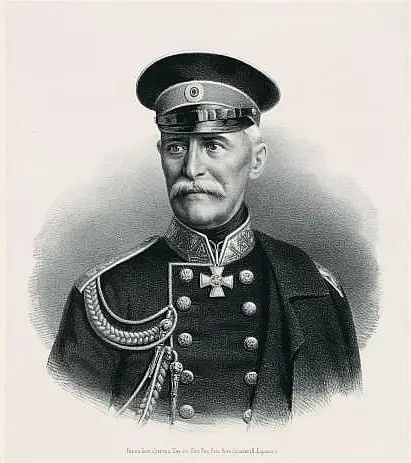
A. S. Menshikov on a lithograph of the mid-19th century
After the defeat at the Battle of Alma on September 8 (20), Menshikov gave the famous order:
In February 1855, he was removed from the post of commander-in-chief with the wording “due to poor health” and returned to St. Petersburg. After the accession of Alexander II, Menshikov left all his posts. Died in 1881.
His only son Vladimir (born in 1816) also served in the army, participated in the Caucasian and Crimean wars, and rose to the rank of cavalry general.
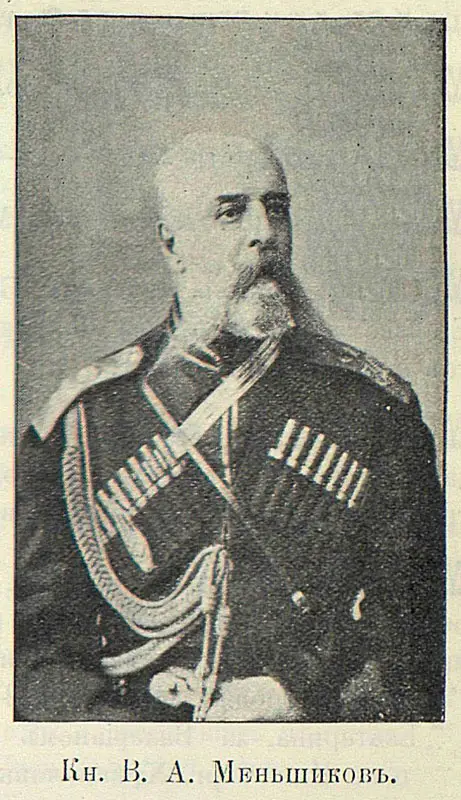
Prince V. A. Menshikov, photograph taken no later than 1893
He passed away in 1893, leaving no offspring, since all his children died in infancy.
Information